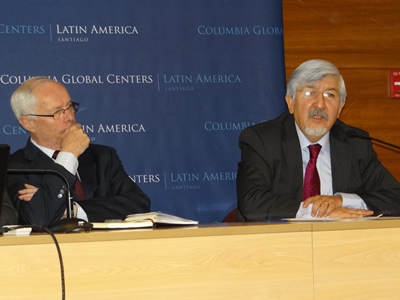ECLAC Highlights Challenges of New Chinese Government and Its Relations with Latin America
Work area(s)

China will become the world's largest economy by 2020 (in terms of GDP), and will be an increasingly important global player. This new position provides the new administration headed by President Xi Jinping and Premier Li Keqiang with a series of internal and external challenges, according to the Economic Commission for Latin America and the Caribbean (ECLAC).
On Friday 12 April, the Director of the International Trade and Integration Division of this United Nations commission, Osvaldo Rosales, took part in the seminar China and its challenges in the era of Xi Jinping, organized by the Columbia University Global Center for Latin America, the Chile Pacific Foundation and the Andrés Bello University.
Other participants included Senator and former Chilean President Eduardo Frei Ruiz-Tagle (by telephone); Director of the Centre for Latin American Studies on China of the Andrés Bello University and former Chilean Ambassador to China, Fernando Reyes Matta; Director of the Chile Pacific Foundation, Manfred Wilhelmy; General Manager of the ASIA-REPS consortium, Yung Han Shen; and Political Advisor of the Embassy of the People's Republic of China in Chile, Zhang Run.
In his presentation, Mr. Rosales highlighted the major transformations that had taken place in China over the past 30 years, including annual economic growth of more than 10%. He explained "Over the past three decades, China has implemented the most intense industrialization process in human history, and achieved in that time what Europe and the United States took 200 years to achieve".
He added that the urbanization process had been the fastest in history, with almost two thirds of the population expected to be living in cities by 2020, and over 500 million people saved from poverty in 30 years.
However, the ECLAC official stated that progress also had negative repercussions, as the same period had seen increased inequality in income distribution, while environmental costs account for almost 10% of GDP.
According to Mr. Rosales "It is estimated that 14 or 15 of the world's 20 most polluted cities are in China. Its energy mix remains highly inefficient, despite major progress in the introduction of thermal energy plants in recent years".
It is the expert's opinion that the major internal challenges faced by the new Chinese Government include finding a balance between economic growth and the environment, advancing in innovation to produce high-quality manufactures and improving the social safety net for its population.
Externally, the country's new status as the engine of developing countries (with China's GDP measured by purchasing power parity expected to exceed that of the United States by 2017), the main challenges are to take up the international leadership role that befits the country based on its economic and political clout, and to improve its financial openness.
Mr. Rosales stated "Everything suggests China will become increasingly involved in the international system to make it fairer and more results-based [...] Hence the importance of strengthening the relationship with Latin America within the context of what was said by Xi Jinping during his visit to ECLAC (June 2011). Our region does not yet have a coordinated response".
He reiterated the need to move towards a new phase in relations between China and Latin America and the Caribbean, with a broader export mix that is not limited to the sale of raw materials. He declared "China is prepared to import manufactures from Latin America, but are we prepared? The rest is up to us".
Osvaldo Rosales concluded by stating the importance of appropriate implementation of public policies to boost productive transformation, increased coordination among Latin American and Caribbean countries to set up partnerships and a shared vision to promote dialogue with China and the creation of multinational projects.
At the end of the seminar, participants agreed that the agendas of China and Latin America and the Caribbean have shared interests and much in common that can be tackled together, such as the balance between the State, the market and society.
Press contact:
ECLAC Public Information and Web Services Section.
ECLAC headquarters: Av. Dag Hammarskjold 3477, Vitacura, Santiago.
E-mail: prensa@cepal.org, Telephone: (562) 2210 2040.